A Day of Play in Future Libraries
by Aramiha Harwood
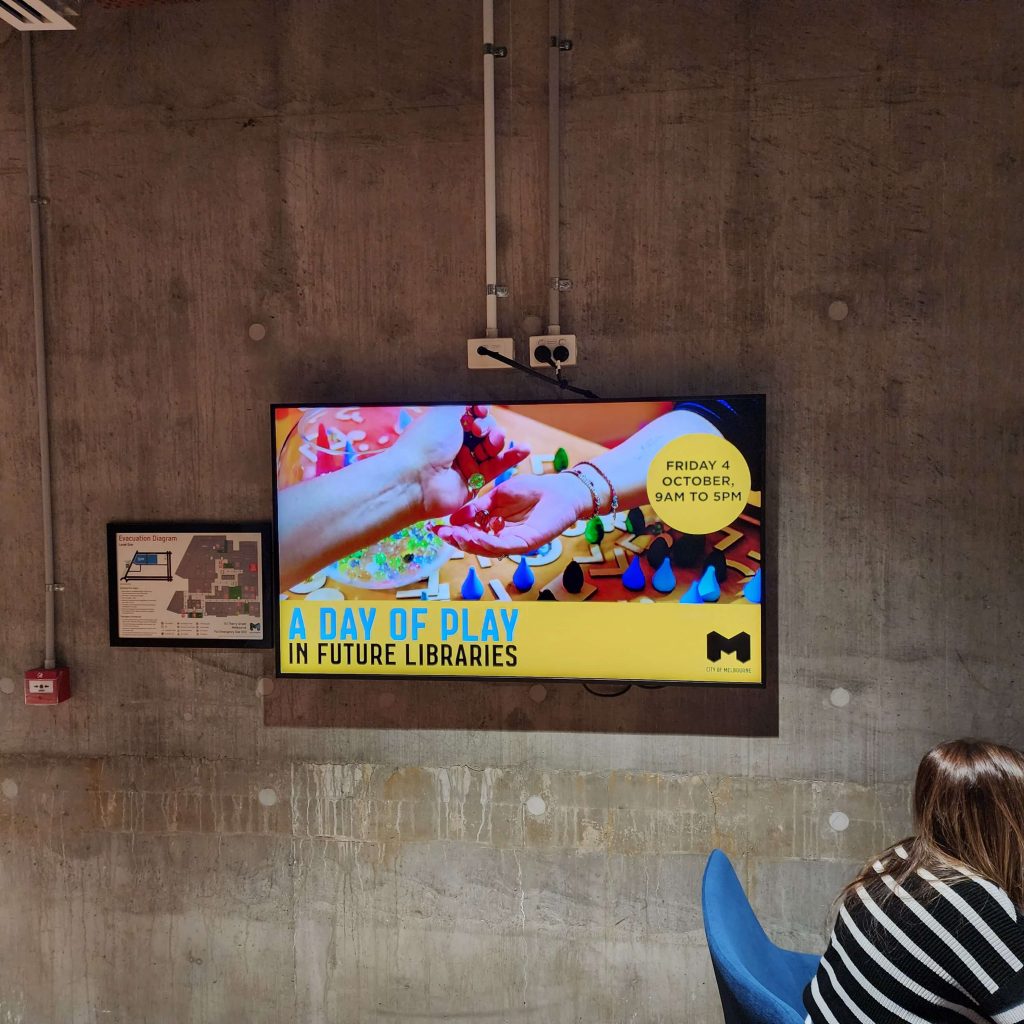
In late 2024, on the first day of the Melbourne International Games Week festival, Future Play Lab joined with narrm ngarrgu Library to put on a day of Play in the Library.
https://futureplaylab.io/projects/future-play-library
narrm ngarggu is a new City of Melbourne Library and Family Services Centre which opened in late 2023. narrm ngarrgu (pronounced nahm nar-GUW) means ‘Melbourne Knowledge’ in Wurundjeri Woi-wurrung language.
Located in the Queen Vic Market precinct of CBD Melbourne, this new library caters to a broad range of clients – young people, families, domestic and international students, tourists and commuters. Not just a library space, narrm ngarrgu is an urban oasis, designed so everyone in our diverse community can explore their interests, learn something new and access integrated family support.
We were interested in the role of libraries as essential social infrastructure connected to place and the role of play in bringing people together to energise and interconnect existing communities, and provide the creative spark for new ones. The opening event included representatives from Bayside and Manningham Council, sparking off conversations on this theme at the start of the day.
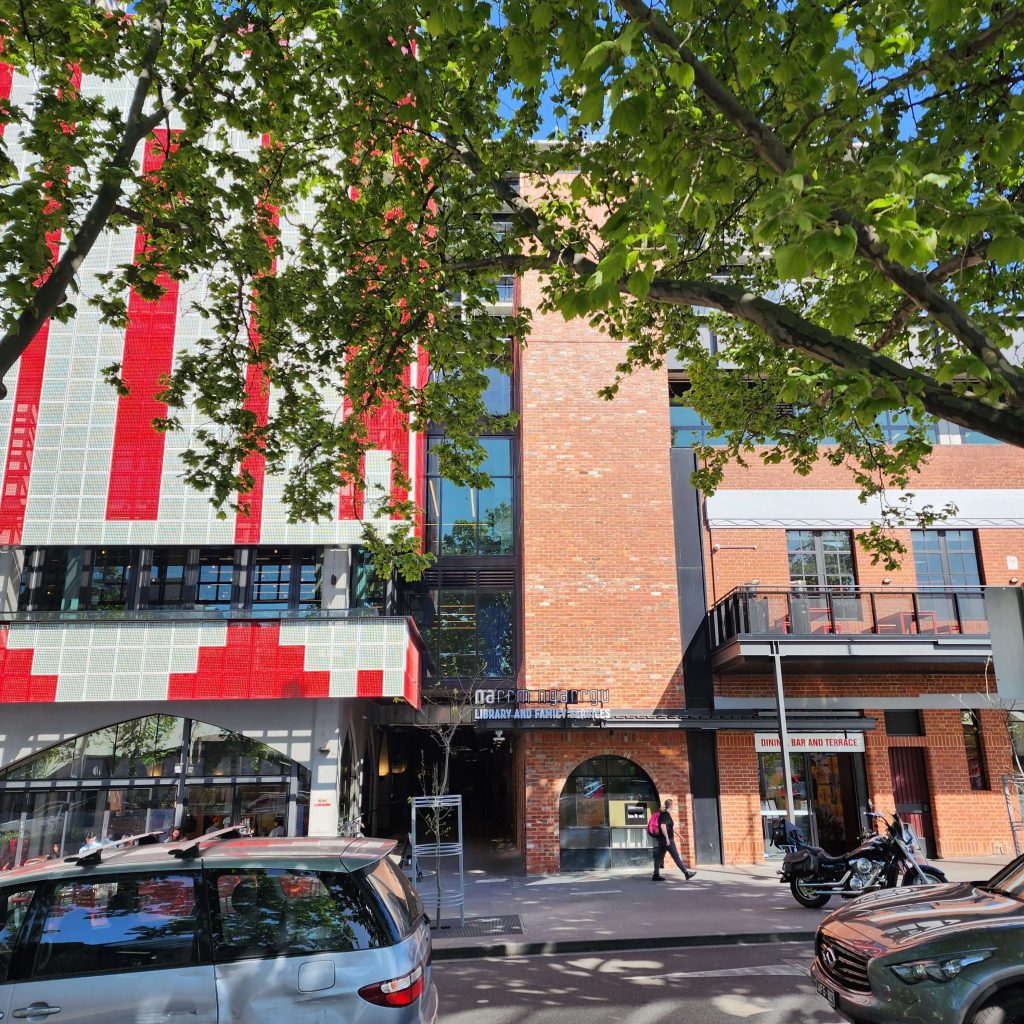
With this in mind, narrm ngarrgu brought together the gaming community in Melbourne to explore the potential of play and gaming to connect, explore the future and to share knowledge with each other. Librarians and gamers, designers and playmakers, researchers and enthusiasts, families and communities, were invited to sample and engage with some possibilities for the future of play – and to imagine the library, as a third place, supporting this.
During the day, there were many opportunities to experience different types of play – organised and freeform – throughout the library. Participants were free to diversify their experiences, by moving from place to place, from play to play. There were web-based games available on the public computers, supplied by game design students at RMIT – via Games Kitchen. https://rmitlink.rmit.edu.au/Clubs/Games-Kitchen
LEGO and jigsaw puzzles were left for younger library attendees to use in the multifunction room on level 3, while Boardgames were placed on multifunction tables in the Event space on level 1 for anyone to come and play with.
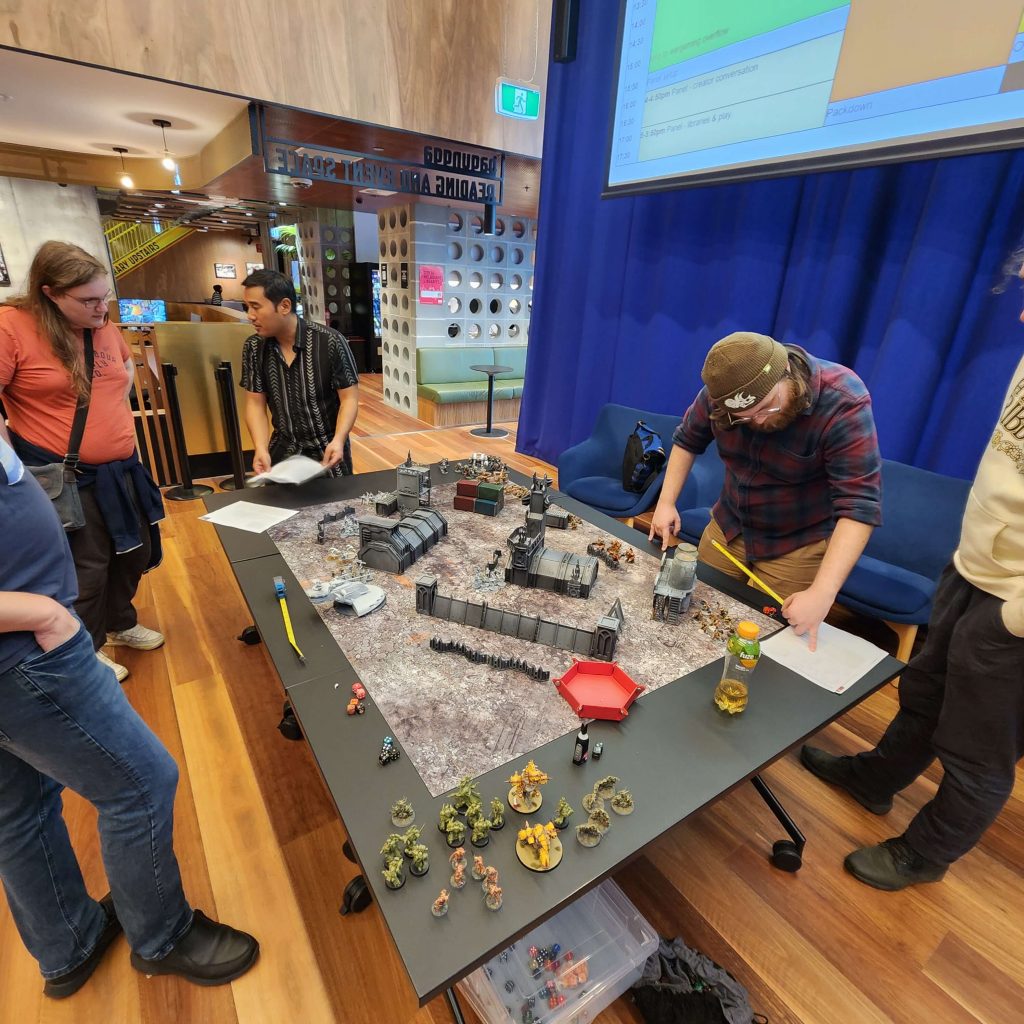
There were several games in particular which were memorable for their engagement and fun.
The Werewolf social game, a perennial favourite for many gamers, was discovered by a group of librarians. Asked to roleplay themselves as villagers (with a couple of insurgent Werewolves), the group worked together through the complex social dynamics and moral dilemmas of ‘the village’ – while trying to solve the mystery of ‘Who are the Werewolves killing our Villagers?’. The game itself is free, an example of it is available here: https://pegasusshop.de/media/pdf/51/d5/38/4250231716614_gb.pdf
The Adaptation Game asked players to consider their place in climate change and our future communities. Roleplaying themselves or an imagined identity into the near future, players faced a growing number of climate events and aasociated social and economic ramifications (eg my player had to try and travel across the CBD of Melb when all public transport infrastructure had collapsed in an unprecedented heatwave). One of the particular elements of interest for me was the fact that the game could be tailored to specific councils and local government areas. That is, the spaces, stories and events in-game were specific to particular locations and places eg CBD Melbourne (City of Melbourne), or the Dandenong mountains (Yarra Ranges council).
Games Kitchen RMIT and Swinburne Gamemakers also ran a Game development session during the afternoon. So many young people came along to enjoy playtesting games and chatting about how to make some of them. This was the biggest success, from the huge number of games, attendees and diversity of imaginative/fun approaches to console and pc gaming design and animation. My Kudos and Congrats to the students from both Universities.
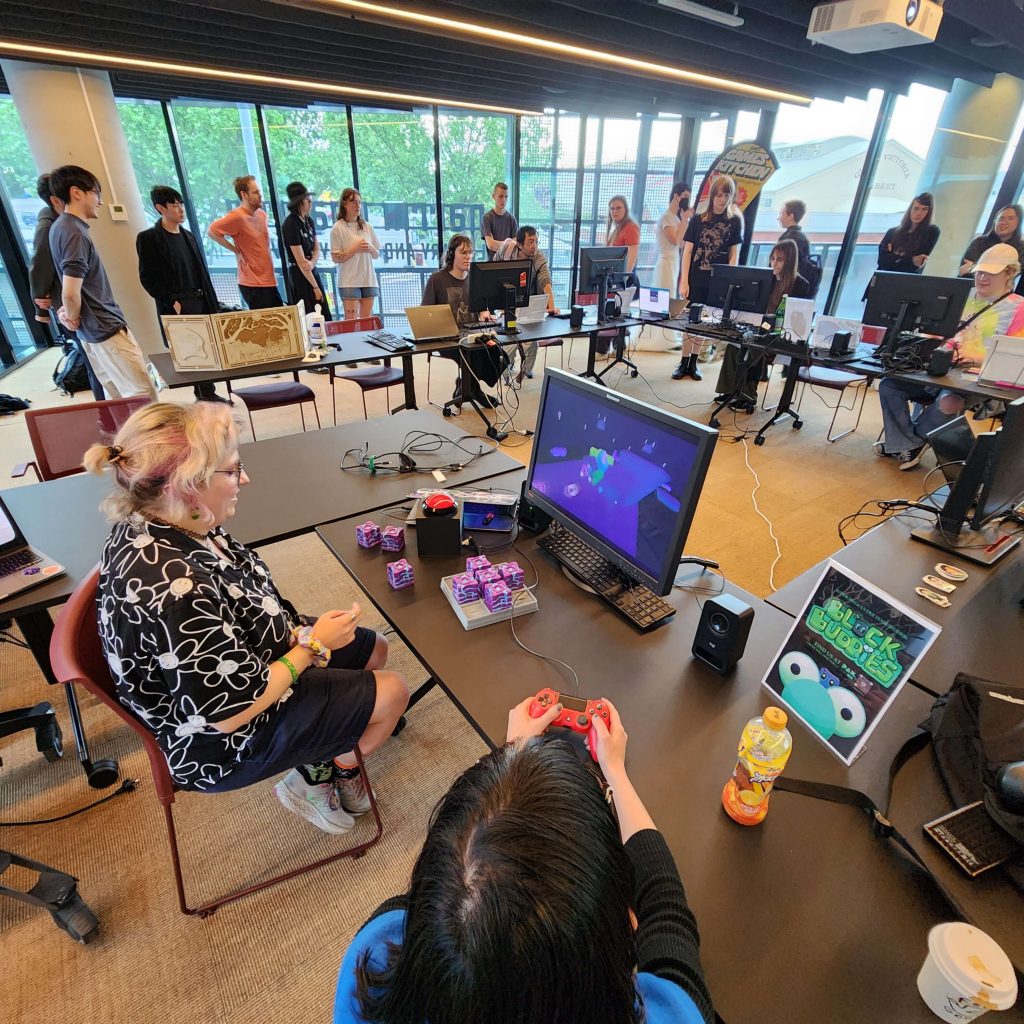
In the evening there were two panels held in the event space. In the first, gamemakers discussed elements of play and gaming in their relative spheres. Letoya from the Indigenous gaming collective GUCK, Leon from Melbourne Megagames, Jason from Amble Studios, and myself, discussed: the state of play in Melbourne in 2024; how the industry is looking for independent game developers; what it is that draws us to gaming, play and gamemaking; and where we think things will be going in the future.
There was some argument over what gaming represents, as an artistic pursuit or as playful distraction – and what this means for the industry and/or sector. It was argued that play can be a useful tool for learning and engagement, through the permission to imagine and to have fun that it entails.
GUCK: https://www.tsumea.com/developer-service/guck
Melbourne Megagames: https://www.melbournemegagames.com/
Jasan Tampake/Amble Studio: https://amble.studio/meet-the-troupe/
Finally, researchers involved with future play lab – Dale Leorke and Danielle Wyatt – joined Lucas Yi to discuss the role of Libraries as the ‘third place’ that could be a supporting hub for play and gaming in most communities and Melbourne in particular. Dale and Danielle discussed their book, The Library as Playground, comparing the approaches to play in libraries around the world, and the spectrum of formal and informal play spaces within these libraries. Lucas provided some perspective on the practicalities of running gaming programs in Melbourne’s libraries, given his own experiences having done so at several suburban libraries. It was agreed that play can be seen in a variety of forms and modes in libraries, and that it can be a useful means of connecting with patrons – many of whom may need the ‘permission/s’ of play to engage with their library and community further.
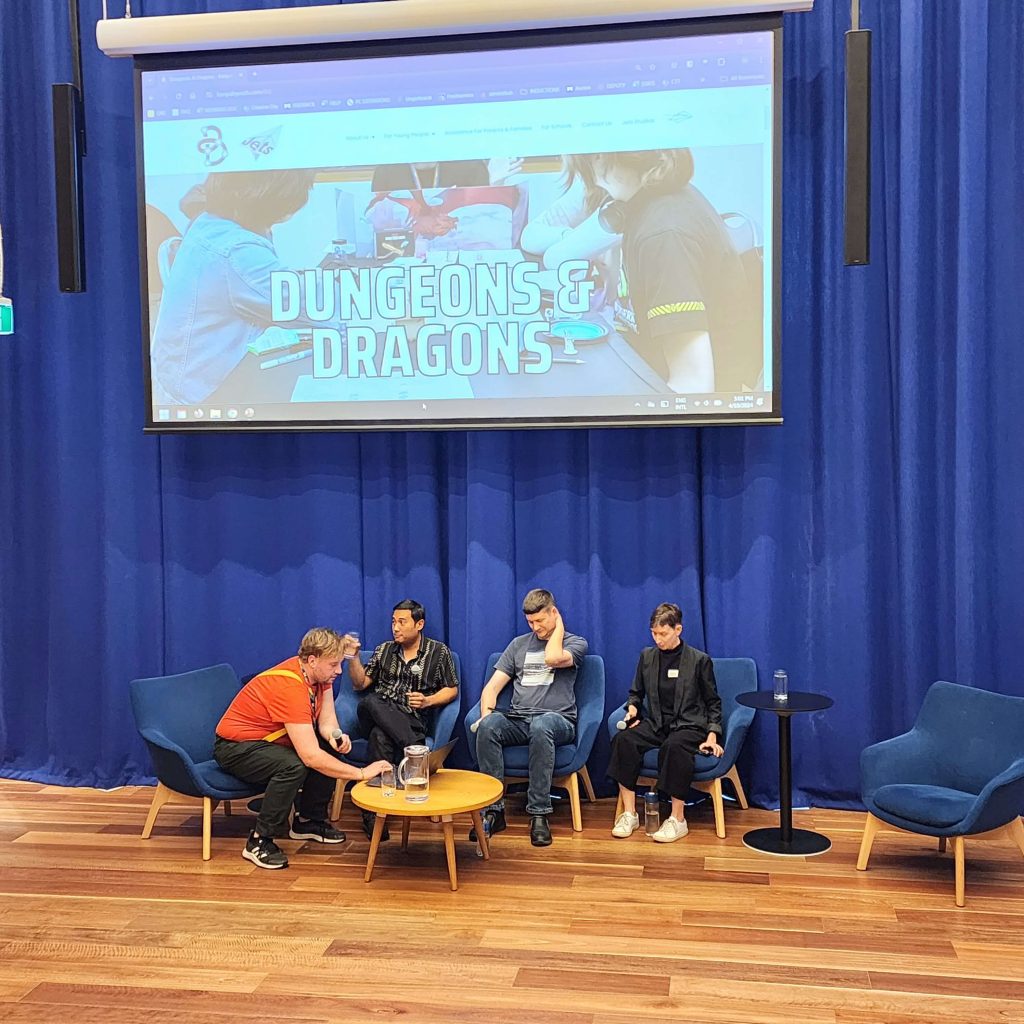
Overall the day was considered a success. There is talk of planning for another Future Play Library day for 2025, with hopefully further funding from invested bodies.
For me I thought it was encouraging that there were so many diverse groups there on the day – gamers, young and old, librarians, and academics. I did find it disappointing that there was a lack of engagement with each other on a personal level, suggesting the need for more social games – something that was left out of the program due to time and resources. The games, in their respective spaces and respective ludic element, remained separated from one another. The greatest disappointment to me was that, besides the library attendees who were open to trying out most of what was on offer on the day, the gamers and playmakers didn’t do likewise. One of the major reasons for making the Future Play Library day happen was for those of us non-industry playmakers and gamemakers to start engaging with one another and supporting each other. A community of practice. As someone who designs, playtests and publishes, I recognise the importance of the community to make all of these things happen! This didn’t really happen, as I observed many of the makers and players focus on their own play activities and not really go outside of that. This was represented in the invitation to have a post-event beer, at the brewery next to narrm ngarrgu, given to all attendees and volunteers in the program, but a more structured social event embedded in the day would be more successful as many people had other MIGW commitments to attend.
I’d suggest
that this may be something to look at for the future Future Play Library – a greater
focus on bringing people together to share knowledge and their love of
play/gaming, as a means of making it sustainable and fun.
As my father always said when beginning meetings in Maori:
He aha te mea nui o te ao? He tangata, he tangata he tangata.
What is the most important thing? It is people, it is people, it is people.
ka kite anō!
seeya later!
